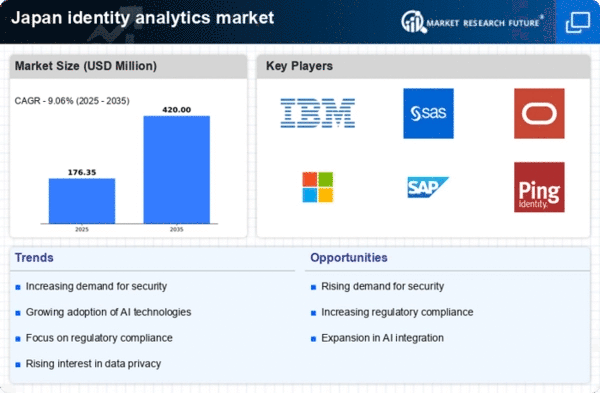Growing Regulatory Landscape
The evolving regulatory environment in Japan is a critical driver for the identity analytics market. With regulations such as the Act on the Protection of Personal Information (APPI) becoming more stringent, organizations are compelled to implement comprehensive identity management solutions. Compliance with these regulations is essential to avoid hefty fines and reputational damage. In 2025, it is anticipated that compliance-related investments will constitute around 20% of total IT budgets for many companies. This regulatory pressure is likely to propel the adoption of identity analytics tools that ensure adherence to legal requirements while enhancing consumer trust. Thus, the identity analytics market is expected to expand as businesses prioritize compliance-driven identity solutions.
Increasing Cybersecurity Threats
The identity analytics market in Japan is experiencing growth due to the rising frequency and sophistication of cyber threats. Organizations are increasingly recognizing the need for robust identity verification and management solutions to protect sensitive data. In 2025, it is estimated that cybercrime could cost the Japanese economy over $1 trillion, prompting businesses to invest in identity analytics to mitigate risks. This market driver highlights the urgency for companies to adopt advanced identity analytics tools that can detect and respond to potential breaches in real-time, thereby enhancing overall security posture. As a result, the identity analytics market is likely to see a surge in demand as organizations prioritize cybersecurity measures.
Adoption of Cloud-Based Solutions
The shift towards cloud computing is significantly influencing the identity analytics market in Japan. As businesses increasingly migrate their operations to the cloud, the need for effective identity management solutions becomes paramount. In 2025, it is projected that cloud services will account for approximately 30% of IT spending in Japan, driving the demand for identity analytics tools that can seamlessly integrate with cloud environments. This trend suggests that organizations are seeking solutions that not only enhance security but also provide scalability and flexibility. Consequently, the identity analytics market is poised for growth as companies look for cloud-compatible identity solutions to manage user access and protect sensitive information.
Consumer Awareness and Demand for Privacy
There is a growing awareness among consumers in Japan regarding data privacy and security, which is significantly impacting the identity analytics market. As individuals become more informed about their rights and the importance of protecting personal information, they are demanding greater transparency and control over their data. This shift in consumer behavior is prompting organizations to adopt identity analytics solutions that prioritize user privacy and data protection. In 2025, it is projected that consumer demand for privacy-centric solutions will drive a 25% increase in investments in identity analytics tools. This trend suggests that businesses must adapt to meet consumer expectations, thereby fueling growth in the identity analytics market.
Rise of Digital Transformation Initiatives
Digital transformation is reshaping the business landscape in Japan, leading to increased investments in technology, including identity analytics. As organizations embrace digital tools and platforms, the need for secure identity management becomes critical. In 2025, it is estimated that over 70% of Japanese companies will have initiated digital transformation projects, creating a fertile ground for the identity analytics market. This trend indicates that businesses are recognizing the importance of integrating identity analytics into their digital strategies to enhance user experience and security. Consequently, the identity analytics market is likely to benefit from this wave of digital initiatives as companies seek to leverage technology for competitive advantage.
















